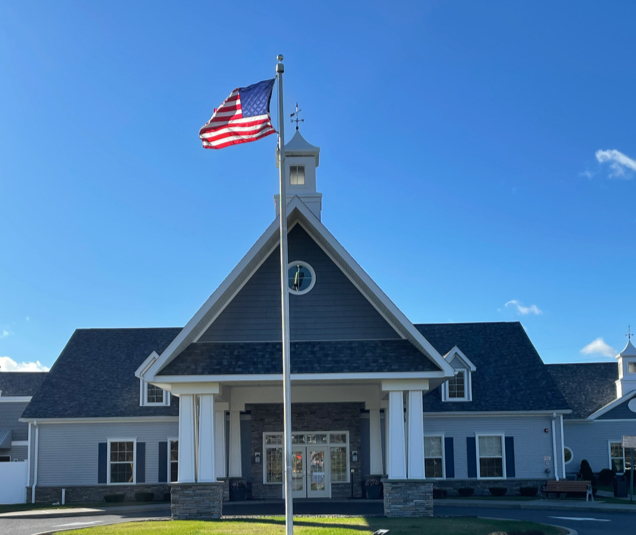Aiding a parent moving through the stages of dementia can be a uniquely challenging experience. You may feel a rollercoaster of emotions, including confusion, sadness, and frustration. There are both practical and emotional challenges, often daunting to face alone.
Some things to consider when dealing with dementia in a parent include:
- Prepare to deal with the diagnosis as a family
- Seek professional support
- Take time for self-care
- Prepare for the financial and legal inevitabilities
- Don’t lose hope
Each person’s experience with a diagnosis like dementia is unique. The above guidelines we’ll discuss offer a good framework for assisting your parent, but the journey ultimately comes down to the individual and their family. Finding support—be that a memory care community or a respite care option—is crucial not only for the seniors dealing with dementia but also for their caregivers to prevent burnout.
Understanding Dementia
Dementia isn’t a specific disease but a general term for a decline in mental ability severe enough to interfere with daily life. This decline comes in many forms, from memory loss to changes in behavior, and can range from subtle to severe. Understanding dementia as an umbrella term for these symptoms is the first step in navigating the complexities that lie ahead.
Common Types of Dementia
Alzheimer’s disease is the most common and well-known form of dementia, but it’s not the only one. Vascular dementia, which occurs after a stroke, is another significant cause, as is Lewy body dementia, characterized by abnormal protein deposits in the brain. Each type presents its challenges and progresses differently, adding to the complexity of caregiving.
Spotting the Early Signs
Early detection is crucial, yet the beginning stages of dementia can be difficult to recognize. Forgetfulness and the loss of day-to-day skills are often early red flags. Families must be vigilant and proactive, seeking medical guidance when noticing consistent and concerning changes in a parent’s cognitive function.
Coping With Dementia as a Family
A dementia diagnosis typically doesn’t affect a single person in the family. So, it’s important to remember to deal with it as a family.
Foster Communication
Open lines of communication can be a lifeline for the senior and their loved ones. Sharing stories, engaging in cognitive activities, and maintaining routines and traditions can help bridge the gap when memory becomes a flighty companion.
Adapting to Behavioral Shifts
Dementia often brings about alterations in personality and mood. Those with dementia may exhibit frustration and confusion as they grapple with changing realities. Families should practice patience and empathy and seek help to develop personalized strategies for handling difficult behaviors.
Managing Daily Routines & Needs
The onset of dementia typically demands a reshaping of daily life. Simple yet critical adjustments, such as medication management and safety measures within the home, ensure that routine tasks remain feasible and that the environment remains conducive to the individual’s well-being.

Professional Support as Your Anchor
Although there isn’t a cure for dementia, an early diagnosis allows for timely interventions that can slow its progression. It also provides a framework for what to expect and the opportunity to plan for the future.
Understanding healthcare options and accessing the appropriate support services can be as daunting as the disease. Engaging with primary care physicians, neurologists, and other specialists can help families construct a comprehensive care plan that addresses their unique needs.
Communities also typically offer various services, from support groups to in-home care, respite care, and adult day centers. Accepting and utilizing these resources can improve the quality of life for the senior and provide support and a broader care network for the family.
The Ripple Effect of Caregiver Stress
The well-being of the caregiver can have a profound impact on the health of the patient. Burnout, anxiety, and depression are common among those who shoulder the responsibility of caring for a loved one with dementia.
Self-care is not selfish—it’s necessary. Establishing a routine that includes physical exercise, time for relaxation, and social interaction can help caregivers recharge and sustain their ability to care for their loved ones.
Navigating Finances & Legalities
The progressive nature of dementia makes future planning a critical consideration. From discussing care preferences to documenting financial assets, an organized approach to the future can grant peace of mind and convey a sense of control in uncertain times.
Managing finances when a parent has dementia can be complex. From dealing with medical bills to ensuring that important documents and accounts are appropriately updated and managed, strategic financial planning can alleviate a significant source of concern for families.
Understanding the legal implications of dementia, such as guardianships and power of attorney, are crucial for ensuring that the individual’s rights are protected and their wishes are honored. Laying the groundwork for these legal matters is best done in the early stages of diagnosis.
Help Is a Phone Call Away
Caring for a parent with dementia is a complex and emotional experience that can test the boundaries of our love and patience. It’s also an opportunity to honor the rich tapestry of memories and experiences that define our relationship with our parents.Call our team at Peregrine Senior Living at Colonie today. We’re happy to book you a community tour so that you and your loved one can see firsthand how our community and compassionate caregivers can help improve your or your loved one’s quality of life despite a dementia diagnosis.













A day with our feathered friends - learning about birds of prey and the importance of wildlife conservation! 🦅🌎🌱
It was such a privilege to host The Wildlife Institute of Eastern NY and their Silent Wings program - thank you for sparking curiosity, joy, and an appreciation of nature in our community 💚 ... See MoreSee Less
4 CommentsComment on Facebook
We just wanna bang on the drum all day 🥁🪘💛 ... See MoreSee Less
1 CommentsComment on Facebook
Dreaming of spring while the snow falls outside ❄️
We love flower arranging! 💐 ... See MoreSee Less
1 CommentsComment on Facebook
Today is National Compliment Day! It’s a reminder to share encouragement and appreciation freely. Remember, it costs nothing to be kind, but the impact of a thoughtful word can last a lifetime!
Tell a friend they make you smile. Thank a caregiver for their dedication. Compliment a resident on their sense of humor or style. 😁
We’ve seen how positivity strengthens bonds and brightens spirits. Let’s make today—and every day—a little kinder.
peregrinecolonie.com/ ... See MoreSee Less
0 CommentsComment on Facebook
Who needs coffee in the morning when you have Latin rhythm and dancing with Carlos?? 💃🏻
Music, movement, and laughter fuel your mind, body, and soul 💜 ... See MoreSee Less
2 CommentsComment on Facebook
Today, we honor the life and legacy of Dr. Martin Luther King Jr.—a leader whose message of equality, compassion, and courage continues to inspire us all.
His dream reminds us that even small acts of kindness can ripple outward and create lasting change.
May we carry his vision forward by leading with empathy, listening with understanding, and building communities grounded in love and unity.
peregrinecolonie.com/ ... See MoreSee Less
0 CommentsComment on Facebook
A new year means new beginnings, and for many, that includes finding a place that feels like home. 🏠❤️
Our community offers the perfect blend of comfort, engagement, and care. Whether you’re looking for a vibrant social lifestyle or the peace of mind that comes from knowing support is always nearby, you’ll find it here.
Schedule your tour today and see how life at Peregrine can help you or your loved one thrive in 2026 and beyond!
peregrinecolonie.com/ ... See MoreSee Less
Learn More
Senior Living | Peregrine Senior Living at Colonie
peregrinecolonie.com
Senior living and memory care near Albany, NY in Colonie. We provide compassionate, supportive care for your loved one. Schedule a tour today!0 CommentsComment on Facebook